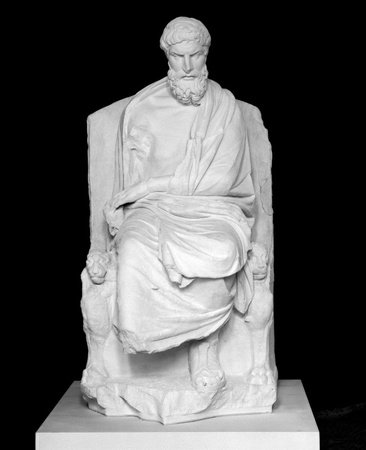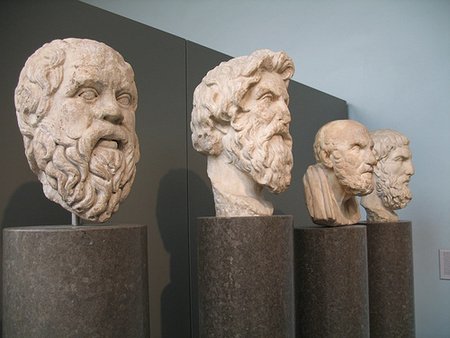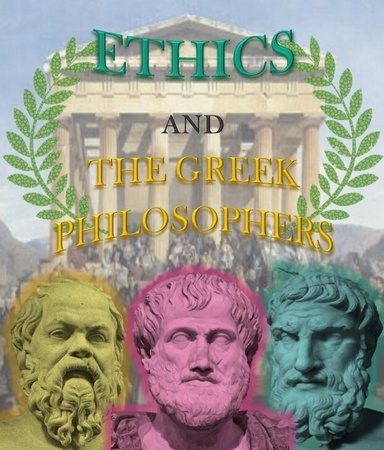
How to Achieve Pleasure... according to Epicurus
Blog by
Last updated: Friday February 2nd, 2024
Report this blog
Last updated: Friday February 2nd, 2024
Report this blog
+5
Quick Links
This blog shall provide an academic overview of Epicurus' theory of moderate hedonism. It is chiefly intended for college students due to the intricate information provided and the high level of vocabulary.
For ease of learning, I have provided some hyperlinks to Encyclopedia Britannica or other relevant websites for certain specific terms.

A statue of Epicurus meditating: tranquility and peace of mind are key to happiness in Epicurean thought
Overview
Born in the Greek colony of Samos shortly before the Hellenistic Period, Epicurus (c. 342-270 BCE) is one of the most prolific hedonistic thinkers, pioneering a leading post-Aristotelian school of thought alongside Stoicism, Scepticism, Neo-Platonism and Cynicism. During the decline of Greek society following the Macedonian conquests of Philip II, citizens lost a sense of personal direction, and ethical philosophy shifted in focus from the benefits of the general public to those of the individual. To Epicurus, the lack of a personal (affecting the present universe) spiritual force proves the necessity to seek regulated pleasure as the final aim in life.
Materialistic Metaphysics
An exponent of materialistic metaphysical thought, Epicurus deduced existence to atoms, hence refuting the existence of any active supernatural deity. Exposed to Leucippus and Democritus’ teachings in his teens, he subscribed to atomism, positing that only elementary, immutable and ‘uncuttable’ bodies (‘atoms’) and void constitute the universe. Given that every object is a compound of smaller segments, it can theoretically be split until its smallest element is derived.
From this natural theory, Epicurus deemed atomic theory and determinism sufficient in explaining universal occurrences, rendering the purported gods unnecessary. Epicurus concluded that no supernatural force exists, meaning that no universal virtues or god must be abided by; hence, one’s own benefit must be sought above all, claiming “self-sufficiency [to be] the greatest of all wealth”. Every form of existence must be material, resulting in the impossibility of an afterlife, as the body’s atoms would merely disperse and not transition to another realm. However, death should not be of concern, seeing that “when we are [conscious], death is not come, and, when death is come, we are not [conscious]” (‘Letter to Menoeceus’).

Democritus: the pioneer of atomism inspiring Epicurus' materialistic attitude to metaphysics; he is known as 'the laughing philosopher' due to his emphasis on the benefit of cheerfulness
Practical Wisdom
Seeing that pleasure is the final goal, Epicurus advocated a temperate hedonistic lifestyle; he defined a ‘pleasant’ life as having “the absence of pain in the body and of troubles in the soul”. Humans naturally seek gratification above all, of which there are three categories: natural and necessary (such as basic food), natural and unnecessary (such as lavish food), and vain (such as fame). The first and second pleasures are interrelated, but the latter is a pampered form of the former – a ‘want’ rather than a ‘need’. Since humans suffice with consuming basic foodstuffs, such as bread and water, the necessity of consuming steak and wine is invalid. Human appetite is equally satiated through either break or steak; therefore, one must be content with simple rather than luxurious goods – “He who is not satisfied with a little, is satisfied with nothing”.
The third type of pleasure – that vain – cannot be fully sated; if one aspires to be a famous chef, they will constantly yearn for more and more fame. Hence, it must never be sought. The unnatural desire for opulence or overindulgence must be eliminated to achieve peace of mind (‘ataraxia’) – a state of serenity and content. To obtain gratification (‘hedone’), Epicurus professed the need to live by natural pleasures – being satisfied with little – and reject indulgent desires. Furthermore, as mentioned previously, any fear of death or god – of the supernatural – only serves as an obstacle to happiness and hence needs to be eliminated.

'The Philosopher's Garden': inspired by Epicurus' garden communities; he lived a simple life with basic resources, preferring a close of group of friends over intimate relationships
Counterarguments to Epicureanism
Epicurus’ materialistic ethics – specifically his notions on death and god – met criticism from several prolific thinkers. His primary rivals – the Stoics – claimed that the inevitability of death should constantly be meditated, but Epicurus maintained that such a thought invariably leads to irrational fear. Eminent Stoic Seneca also highlighted the necessity of basing life on adherence to virtue rather than pleasure – “Let virtue lead the way: then every step will be safe” (‘De Vita Beata’). They also believed that displeasure should be embraced to fortify one’s character, such that Epictetus asserted that “faced with pain, you will discover the power of endurance” (‘Enchiridion’). Epicurus countered the prevalence of virtue as counter-intuitive, as humans naturally seek pleasure but not morality; therefore, regulated gratification must be prioritised and pain averted.

The Stoics: the main opponents to Epicurean thinking, positing that pain is needed to develop one's character and hence become happier
Conclusion
To Epicurus, the absence of a personal supernatural occurrence or being owing to the existence of infinite, eternal atoms ensures the impossibility of an afterlife, omnipotent deity and universal moral code. Rooted in human instinctive behaviour, pleasure through ‘hedone’ and ‘ataraxia’ should be sought by living moderately and serenely, straying from desires and apprehension over death and superstition. His ethical philosophy can be summarised in his ‘Tetrapharmakos’ – “Don’t fear god, don’t worry about death; what is good is easy to get, and what is terrible is easy to endure”.
Further Reading

This blog is part of a set concerning the ETHICS AND THE GREEK PHILOSOPHERS. The rest can be accessed from my Philosophy series, listed consecutively as the first category of blogs.
